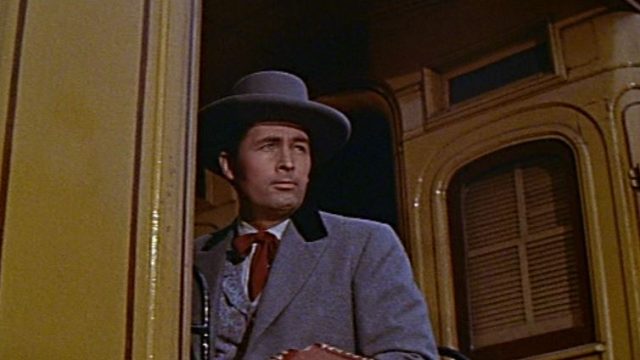The problem with this movie on a narrative level is that Walt, screenwriter Lawrence Edward Watkin, and director Francis D. Lyon were more or less constrained by the historical record. Oh, for Walt, it was always less rather than more, goodness knows. There are plenty of examples of that, even if my own Most Egregious History example is from well after Walt’s death. Still, if this movie ends on an anticlimax, that’s because that is sometimes the case with history. There is nowhere you can stop the story for a grand climax, though I think making the framing device a simple ending instead might have helped.
James J. Andrews (Fess Parker) was born in Virginia and moved to Kentucky. In April 1862, he and a handful of soldiers went on a raid to Marietta, Georgia, where they would steal a train and drive it north to Chattanooga, sabotaging the rails and the telegraph behind them, allowing General Ormsby M. Mitchel to take the city and cut the east-west Confederate rail lines in half. The men must initially pose as Confederate sympathizers from Kentucky on their way to join the army. Unfortunately for Andrews and his men, even the weather seems to have been against them.
While Walt was born in Chicago, he grew up in Marceline, Missouri—in an area of the state that was strongly Confederate during the war. Watkin was from New York and therefore considerably less likely to be influenced in childhood by Southern sympathizers. Still, it’s worth noting that this is the second as less well known feature telling of the story—and unlike Buster Keaton’s, this is told from a Union perspective. It’s more interested in William Allen Fuller (Jeffrey Hunter), the conductor of the pursuing train, than it needs to be, and Fess Parker ends up delivering an unfortunate “we’ll have to get along after the war” speech to him, but after all Fuller isn’t the hero of the story this time.
John Lupton is doing fine work in the James McAvoy role of Person Watching Interesting Things Happen To Someone Else. Oh, it’s true that Corporal William Pittenger was one of the raiders, but the movie’s from his perspective because he literally wrote the book. The hero is very much Andrews—who was ineligible for the Medal of Honor that the others won because, with the sole exception of William Hunter Campbell (Jeff York), the others were all soldiers and Andrews and Campbell were not. In this version, Campbell has been reworked into a soldier, and they’ve left out the frankly awful bits of his death—which were because he was so large that the rope wasn’t strong enough for him.
The events this movie details won the assorted soldiers the first-ever Medals of Honor and inspired one of most famous and thrilling Buster Keaton films. You could get a really good movie out of it that was actually from the Union perspective, and this . . . isn’t it. It’s fine. The filming is fine. The action is fine. The acting is fine. We get a sense here of how cursed the men must’ve felt about their mission—they set a boxcar in a covered bridge on fire, and the bridge is fine and the train pursuing them isn’t stopped. It’s all pure bad luck on their part, but what with the rain and the timing, war can really be hell.
I actually paid real American dollars for this movie, which isn’t on Disney+; reward my devotion by supporting my Patreon or Ko-fi!

